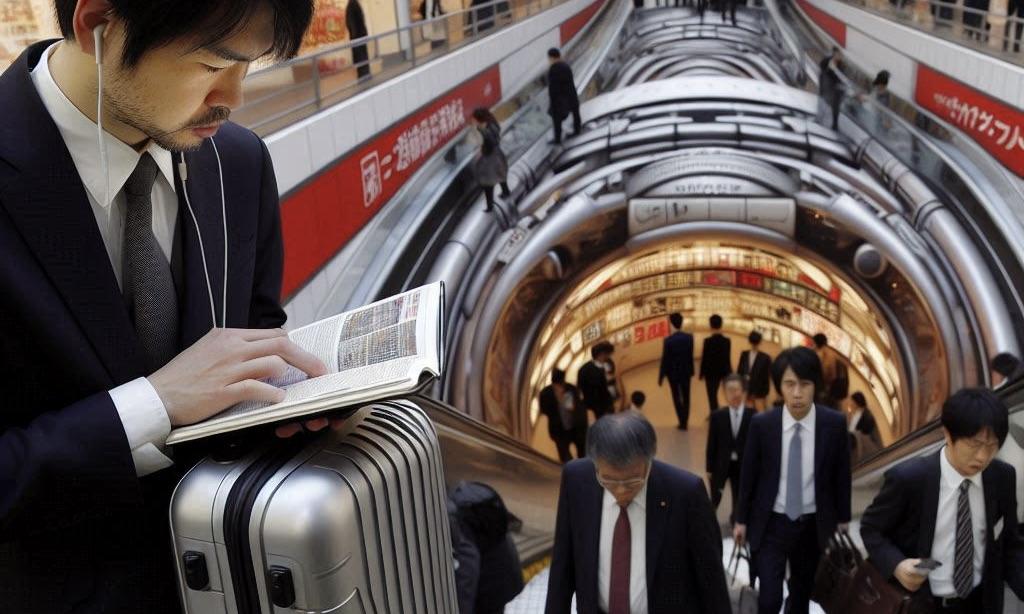A recent Kyodo News survey shows that 70% of major Japanese companies expect economic growth next year, down from 80% a year ago. Concerns over inflation and the weak yen's impact on consumer spending drive this optimism decline among Japanese firms.
Japanese Companies Lower Economic Growth Expectations Amid Inflation and Weak Yen, Survey Reveals
A Kyodo News survey conducted on August 11 revealed that approximately 70% of major Japanese companies anticipate the expansion of the country's economy in the upcoming year, a decrease from approximately 80% a year ago. This decrease is attributed to concerns regarding inflation and the impact of a weaker yen on personal consumption.
In the survey of 111 firms, including Toyota Motor Corp. and cosmetics manufacturer Shiseido Co., 72 percent predicted that the economy would expand solidly or grow moderately, with numerous respondents citing a recovery in consumer spending.
Although the percentage was lower than the 82 percent anticipated growth last summer, the most recent survey revealed that 23 percent expect a moderate or flattening economy, an eight-percentage point increase. This indicates that certain companies are becoming more cautious.
Eighty-four percent of those who predicted economic expansion cited a recovery in consumer spending as the reason for their response, followed by a recovery in capital spending at 79 percent and increased spending by foreign visitors at 53 percent, with multiple answers permitted.
Sixty-four percent of those who anticipated a stagnant economy attributed it to a decline in consumer spending. In comparison, 48 percent attributed it to the adverse effects of a weak yen and increasing prices.
Survey Shows 70% of Japanese Firms Report Earnings Growth, But Uncertainty Remains Over Wage Policies and Inflation
Additionally, the survey, which encompassed prominent companies in each sector, revealed that seventy percent of the firms observed an upward trend in their earnings.
Although 42 percent of the companies indicated that they intend to increase the prices of their products and services in the coming year, 76 percent were still determining their wage policy for the spring wage negotiations in 2025.
When asked about the policies that Prime Minister Fumio Kishida's government should pursue, 35% of respondents indicated that the low birthrate and aging population should be addressed. In comparison, 34% cited measures to address the weakening yen and skyrocketing prices.
Japan was the most frequently cited country or region in terms of the country or region where companies intend to concentrate their operations, capital investment, and expenditure on research and development while considering economic security by 58 percent, followed by North America at 35 percent and Southeast Asia at 32 percent.
Meanwhile, only 6% of respondents expressed a desire to prioritize China.
Of the respondents, 10% intend to expand their operations in China, 9% consider reducing their business operations, and 40% plan to maintain their current operations there.
According to Kyodo News, the survey was conducted from mid-July to early August. The results do not accurately reflect the recent, turbulent movements in the stock and foreign exchange markets, influenced by the Bank of Japan's additional interest rate increase and the increasing apprehension regarding the U.S. economy.



 Japanese Pharmaceutical Stocks Slide as TrumpRx.gov Launch Sparks Market Concerns
Japanese Pharmaceutical Stocks Slide as TrumpRx.gov Launch Sparks Market Concerns  South Korea’s Weak Won Struggles as Retail Investors Pour Money Into U.S. Stocks
South Korea’s Weak Won Struggles as Retail Investors Pour Money Into U.S. Stocks  Global Markets Slide as AI, Crypto, and Precious Metals Face Heightened Volatility
Global Markets Slide as AI, Crypto, and Precious Metals Face Heightened Volatility  Trump’s Inflation Claims Clash With Voters’ Cost-of-Living Reality
Trump’s Inflation Claims Clash With Voters’ Cost-of-Living Reality  Asian Stocks Slip as Tech Rout Deepens, Japan Steadies Ahead of Election
Asian Stocks Slip as Tech Rout Deepens, Japan Steadies Ahead of Election  Vietnam’s Trade Surplus With US Jumps as Exports Surge and China Imports Hit Record
Vietnam’s Trade Surplus With US Jumps as Exports Surge and China Imports Hit Record  Gold and Silver Prices Slide as Dollar Strength and Easing Tensions Weigh on Metals
Gold and Silver Prices Slide as Dollar Strength and Easing Tensions Weigh on Metals  SpaceX Pushes for Early Stock Index Inclusion Ahead of Potential Record-Breaking IPO
SpaceX Pushes for Early Stock Index Inclusion Ahead of Potential Record-Breaking IPO  CK Hutchison Launches Arbitration After Panama Court Revokes Canal Port Licences
CK Hutchison Launches Arbitration After Panama Court Revokes Canal Port Licences  FDA Targets Hims & Hers Over $49 Weight-Loss Pill, Raising Legal and Safety Concerns
FDA Targets Hims & Hers Over $49 Weight-Loss Pill, Raising Legal and Safety Concerns  Oil Prices Slide on US-Iran Talks, Dollar Strength and Profit-Taking Pressure
Oil Prices Slide on US-Iran Talks, Dollar Strength and Profit-Taking Pressure  Uber Ordered to Pay $8.5 Million in Bellwether Sexual Assault Lawsuit
Uber Ordered to Pay $8.5 Million in Bellwether Sexual Assault Lawsuit  Trump Signs Executive Order Threatening 25% Tariffs on Countries Trading With Iran
Trump Signs Executive Order Threatening 25% Tariffs on Countries Trading With Iran  RBI Holds Repo Rate at 5.25% as India’s Growth Outlook Strengthens After U.S. Trade Deal
RBI Holds Repo Rate at 5.25% as India’s Growth Outlook Strengthens After U.S. Trade Deal  Trump Backs Nexstar–Tegna Merger Amid Shifting U.S. Media Landscape
Trump Backs Nexstar–Tegna Merger Amid Shifting U.S. Media Landscape  American Airlines CEO to Meet Pilots Union Amid Storm Response and Financial Concerns
American Airlines CEO to Meet Pilots Union Amid Storm Response and Financial Concerns  Fed Governor Lisa Cook Warns Inflation Risks Remain as Rates Stay Steady
Fed Governor Lisa Cook Warns Inflation Risks Remain as Rates Stay Steady 































